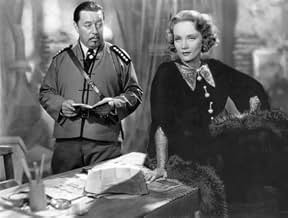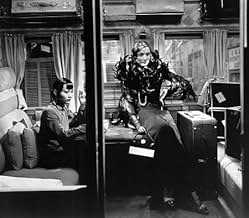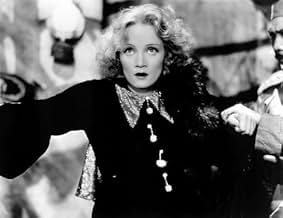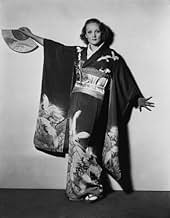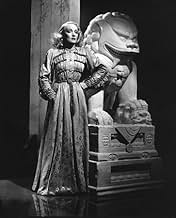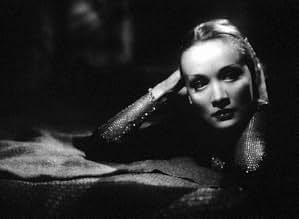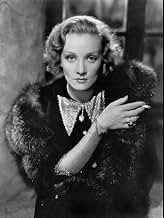Eine Frau trifft während einer gefährlichen Zugfahrt nach Schanghai auf einen ehemaligen Geliebten.Eine Frau trifft während einer gefährlichen Zugfahrt nach Schanghai auf einen ehemaligen Geliebten.Eine Frau trifft während einer gefährlichen Zugfahrt nach Schanghai auf einen ehemaligen Geliebten.
- Regie
- Drehbuch
- Hauptbesetzung
- 1 Oscar gewonnen
- 2 Gewinne & 2 Nominierungen insgesamt
- Dr. Professor Jack
- (Nicht genannt)
- Minor Role
- (Nicht genannt)
- Carey
- (Nicht genannt)
- Chinese Soldier
- (Nicht genannt)
- Chinese Officer Checking Passports
- (Nicht genannt)
- British Officer at Shanghai
- (Nicht genannt)
- British Railway Officer
- (Nicht genannt)
- Undetermined Secondary Role
- (Nicht genannt)
- Train Engineer
- (Nicht genannt)
Empfohlene Bewertungen
"Shanghai Express" is a great Pre-Code Film with magnificent performances of the gorgeous Marlene Dietrich and Anna May Wong. The melodramatic romance about the lack of faith in love and the recounter of two former lovers in the environment of the Chinese Civil War in 1931 is engaging with wonderful black and white cinematography. Marlene Dietrich deserved a better romantic pair since the wooden Clive Brook does not have good performance. My vote is seven.
Title (Brazil): "O Expresso de Shanghai" ("The Shanghai Express")
Apart from Oland and Dietrich, Anna May Wong, Clive Brook, Lawrence Grant and Eugene Palette, among others, are on hand to provide some color. Ms. Wong, in particular, had some excellent scenes playing a Chinese prostitute and defender of the Chinese Republic (a strange combination, I know).
As far as Grant goes, his was a truly unusual character. His Reverend Mr. Carmichael was odd because initially he came off as such a prudish and self-righteous jerk--so much so that the studio was forced to re-write his character and soften him up some as to avoid offending religious sensibilities of the audiences. However, by changing a few scenes, they made him one of the most unusual and three-dimensional minsters portrayed in film during the era. How he came to actually like and respect Dietrich (the prostitute) may seem a bit silly to some, but I actually liked the way they re-wrote the film. As a result, of all the passengers, Grant's came off as perhaps the most interesting.
As far as the film goes, in addition to good performances, the writing, direction and cinematography were all exceptional. A top-notch film that sure will keep your interest as you follow this train through rebel territory in China.
About the only negative about the film might be that it promotes the old film cliché of "the prostitute with a heart of gold"--in fact, it has this times two! Just once, I'd like to see a film where the prostitute isn't so glamorous (perhaps with a few herpes scabs) and isn't a nice person after all!! Imagine if PRETTY WOMAN had followed THAT formula!!
Essentially, the movie is Ms. Dietrich's star vehicle, kit up with astounding sartorial creations from Travis Banton, and looks gorgeously photogenic under von Sternberg's meticulous coordination, she plays a courtesan named Shanghai Lily, of all people, she chances upon her ex-lover, British Captain Donald "Doc" Harvey (a stiff upper-lipped Brook) on the express, while the pair's romance duly begins to rekindle, Chang and his rebellious rabble hijacks the train and detains Doc as a valuable hostage, soon, it falls to two women's hands to take the situation out of jeopardy, one is Shanghai Lily, who acquiesces to Chang's commander for the sake of Doc's safety, another is her companion, a Chinese working girl Hui Fei (a piercing-looking Wong, the first Chinese-American star in Hollywood), who successfully lands on her feet after a vengeful assassination.
Sardonically, the rest western passengers are more or less one-note laughing-stocks, casual scorn is cast upon an opium merchant and self-professed "invalid" Eric Baum (von Seyffertitz), a priggish Reverend Carmichael (Grant) and a congenital bettor Sam Salt (Pallette), whereas Henry Chang is accountable for all the contempt, conversely it is the gamble of love and faith that transpires after its torpid escape hubbub, and it is Shanghai Lily's clandestine repentance finally softens the film's cynical temperament and veers into the usual trajectory of a cheesy romance, but what an extravaganza is on show, von Sternberg's expressionistic idiom would totally normalize the standards we view movies even today, whether it concerns narrative cohesion, the marshaling of a huge set, or spectacular montage arrangements, no wonder audience at that time could rapturously fall under his spell, SHANGHAI EXPRESS is the highest grossing movie of 1932, even today, it demands our collective gaze.
Wusstest du schon
- WissenswertesThe extras in the film mostly speak Cantonese - a Chinese dialect used mainly in southern China. If the film were to be more accurate, the extras would speak Mandarin, but most Chinese residents in the Los Angeles area (who worked as film extras) spoke Cantonese, necessitating Josef von Sternberg use Cantonese. Even so, Cantonese was spoken by a lot of Chinese as Mandarin gradually gained ground.
- PatzerThe film is set in northern China (Peking to Shanghai). The government and warlord soldiers are speaking Taishanese, which is a southern Chinese dialect not generally spoken in northern China. The northern dialects of Mandarin Chinese (a Beijing dialect) and/or Shanghainese would be spoken instead.
- Zitate
Mr. Henry Chang: All the money in the world can't wipe out his insult to me.
[Shanghai Lily tries to shoot him]
Mr. Henry Chang: You only had my interest before. Now you have my admiration. I could love a woman like you.
Shanghai Lily: You made me an offer to leave with you. Does it still hold good?
Mr. Henry Chang: I wouldn't trust you from here to the door. What assurance have I you won't trick me?
Shanghai Lily: I give you my word of honor.
Mr. Henry Chang: A man is a fool to trust any woman, but I believe a word of honor would mean something to you.
- Alternative VersionenComments in the AFI Catalogue suggest the credits were changed when re-released in 1935. According to the Catalogue, the original print referred to Harry Herveys work as a novel. In the viewed print on TCM, the onscreen credit was "story." The print was clearly a re-released print because of the PCA certificate number listed onscreen; such numbers were not issued until 1934. It is not known what other changes were made, if any, but the print ran only 82 minutes, suggesting some additional editing had been done.
- VerbindungenFeatured in Erpresser (1935)
Top-Auswahl
- How long is Shanghai Express?Powered by Alexa
Details
- Erscheinungsdatum
- Herkunftsland
- Sprachen
- Auch bekannt als
- El expreso de Shanghai
- Drehorte
- Produktionsfirma
- Weitere beteiligte Unternehmen bei IMDbPro anzeigen
- Laufzeit
- 1 Std. 22 Min.(82 min)
- Farbe
- Seitenverhältnis
- 1.37 : 1

